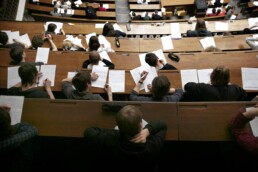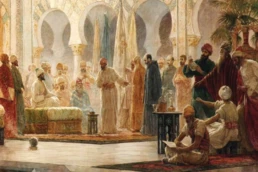A major problem the Muslim laity have been subjected to is the way in which the ‘scholarly tradition’ is abused.
How so?
Well past scholars have written a lot. They’ve often explicitly changed their opinion, or you can see an evolution in their thinking/arguments. Popular religious personalities pay little attention to this, usually because they haven’t read wide enough nor intend to. Now of course, any scholar can’t possibly read everything out there on a topic, but if s/he has a sound basis in the Qur’an and hadith, and recognises everything else as either an explanation of the two (fiqh), or a justification of the methods used to derive an explanation of the two (usul), then there’s a critical engagement with past scholars that is far more meaningful. It also means that the scholar places where authority is – with God. Past scholars are a heuristic tool – we remain in conversation with thousands of scholars across the centuries to bounce ideas off them and evaluate what they bring to the table.
But this doesn’t happen because people are more interested in what Ghazali or Ibn Taymiyyah said than what God and His messenger said. Yes, the laity require someone authoritative to interpret revelation, but placing ultimate authority in medieval scholars raises the same problems: they too need interpreting and contextualising for the laity! So in reality, the laity vest authority in popular religious personalities and who they choose to promote. Accordingly, the scholars that are cited today aren’t necessarily those who buttressed mainstream scholarship over a millenium. They have been chosen in the modern period. In our context, the names of Ibn Taymiyyah, Ibn Qayyim, Ibn Kathir and Ibn Hazm only became as widespread a few decades ago. But what about Ibn Daqiq, al-Mizzi, al-Sakhawi, Ibn Asakir, etc? Yes some know of them, but in no way are they mainstream. Why? Simply because they weren’t chosen by contemporary preachers and sects. Your understanding of your religion is not objective – it is shaped by a plethora of forces. And in every age/context there are different forces shaping it. If you get that simple truth it makes you less polemic, far more chilled, and I’d argue much more closer to the Quran – the only holistic source that is infallible (‘isma).
Now because we’re at an embryonic stage of scholarly formation in the west, there is no benchmark or basic standard of scholarly inquiry, nor are the intelligent laity informed enough to recognise it, so much falls on superficial markers of shar’i learning. Where a higher level emerges or is propagated, it is seldom recognised and either maligned or ignored. it was in this vein that Ibn Hazm put it that scholars who wanted to engage the laity would have sacrifice some of their dignity. As the Mother of Believers Lady A’ishah put it, “How quick people are to find fault with that which they don’t know/understand!” (Sahih Muslim) To some extent, in the past there was an understanding: Scholars informed preachers, and preachers simplified for the laity. Today, preachers are deemed scholars but they’re little informed, and the laity are worse off as a result.
Most preachers/religious personalities are in a rush to say the next great thing. Social media has only amplified this ingenious proclivity. I can always tell when a preacher/religious personality has come across a quote for the first time using it to draw an entire narrative. But as a result of such myopia, usually, the narrative is either wrong or off-piste. This occurs with the most famous of preachers/religious personalities who are still very clearly in their formation stage (even after decades of ‘learning’). Had they sat on the quote for a while and explored the subject further, over time they’d come across something else that would contextualise the initial quote or moderate their take on the matter. But the pursuit of a holistic narrative and understanding is VERY rarely the objective.
A solid grounding in knowledge that a person then wants to ‘share’ with the universe must start with first principles. Everything is built on something else. They should be able to justify each level/stage of their argument, and show how their argument relates to other subjects in order to bring the shari’ah together as a coherent whole. They should be aware of the biases/influences, and own them. Every shar’i conclusion ought to be an explication of the Quran. If it doesn’t go back to the Quran, whether the divine address (khitab) is explicit or implicit, it is baseless and merely fanciful whims uttered in the name of God. The sunnah gives us insight as to what God wants in practice, whilst we mitigate for the variances in culture between 7th Century Arabia and 21st Century Western English speaking world.
Related Posts
2 Comments
Add comment Cancel reply
This site uses Akismet to reduce spam. Learn how your comment data is processed.





Mashallah; an on-point, measured and much needed post.
So are you saying we can quote any past scholars deviant opinions? Technically it fits the principles you just established.
If not, ur contradicting yourself